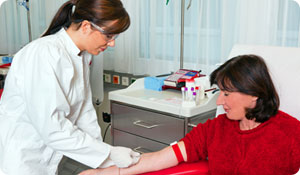
Every two seconds someone in the U.S. needs blood, according to the American Red Cross. What's more, nearly 38,000 blood donations are needed every day. Needless to say, the demand for blood is high.
But blood donations are very popular among many Americans. In fact, nearly 16 million donations are collected each year. Giving blood is straightforward, safe, and infinitely helpful to those in need. So if you want to join the effort, there are some steps you can take to ensure the process is as easy as possible:
1. Find a donation location. Hospitals, schools, and businesses are among a variety of locations where you may find a blood drive.
2. Eat well. Proper nutrition is essential to the donation process, so make sure you eat a good meal prior. Moreover, consider consuming foods that are rich in iron—spinach, fish, lean meats, whole grains—to boost your hemoglobin levels.
3. Stay hydrated. The American Red Cross suggests drinking an extra 16 ounces of water and fluids prior to donation. This will help prevent any lightheadedness during and after the procedure.
4. Get plenty of rest. Although the process is safe, many first time donors feel anxious right before. Having a good night's sleep the night before will help alleviate any stress the blood donation may cause.
5. Dress comfortably. Because blood will be drawn from your arm, try to avoid wearing long sleeves to provide easy access to your veins. Also, wearing clothes that are loose or stretchy, like sweat pants, will help improve your blood flow.
6. After your donation, be sure to follow the technician's advice. There are some procedural requirements you'll be asked to follow:
- Stay to eat and hydrate. Most donation locations will require you to stay an extra 15 minutes to ensure you're not lightheaded and susceptible to fainting.
- Avoid heavy lifting or exercise. Because your body will be busy replenishing your blood supply, it's essential to avoid strenuous activity for five hours after donating. Neglecting this advice may bring about headaches, nausea, lightheadedness, or fainting.
- Call the Red Cross if you don't feel well. If after you leave the donation location something doesn't feel right, call their toll-free number.





